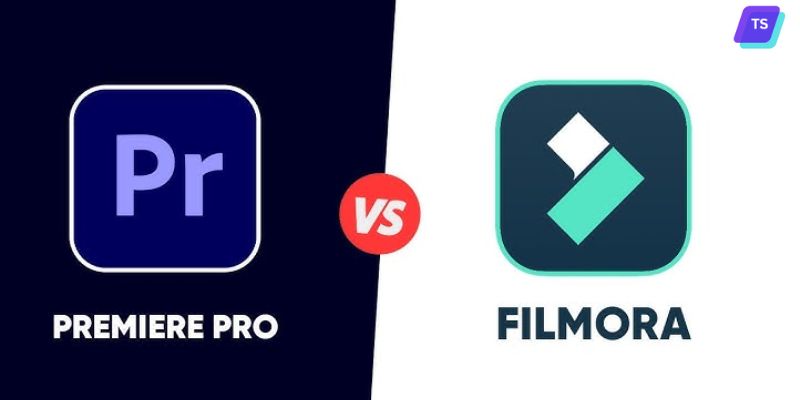Are you in search of the top video editing software for 2026? Choosing the right video editing software can significantly improve your creative workflow. Adobe Premiere Pro and Filmora are two popular platforms that cater to various user needs. Premiere Pro is a professional-grade editor popular among filmmakers and content creators, but Filmora has a simpler, user-friendly interface that is perfect for casual editors and small businesses. Video content creation in 2026 demands tools that are not just powerful but also intelligent and accessible. Whether you're producing short-form social videos or cinematic projects, the choice often narrows down to two editors: Adobe Premiere Pro and Wondershare Filmora.
This article compares Premiere Pro vs. Filmora from every angle—performance, AI features, pricing, and more—to help you pick the right video editor for your needs.
What is Adobe Premiere Pro?
Adobe Premiere Pro is professional video editing software developed by Adobe Systems. It is widely used in the film, television, and internet content industries and provides a full range of video, audio, and motion graphics editing capabilities. Premiere Pro supports a range of codecs and works smoothly with other Adobe Creative Cloud tools such as After Effects, Photoshop, and Audition. It has a timeline-based editing interface, wide color grading, effects, transitions, and multi-camera support. Premiere Pro is designed for professionals and serious producers, offering precision, versatility, and scalability for creating high-quality video content across platforms and industries.
Key Features:
- Advanced timeline-based editing
- Lumetri Color for professional color grading
- AI tools via Adobe Sensei (Auto Reframe, Scene Edit Detection, Speech-to-Text)
- Supports 4K, 8K, HDR, and VR video editing
- Multi-camera and layered audio editing
Target Users: Professional editors, studios, content creators requiring deep control
User Rating: 4.7/5 (based on Software Advice)
What is Wondershare Filmora?
Wondershare Filmora is user-friendly video editing software for beginners and intermediate creators. It has an intuitive drag-and-drop interface that allows you to create polished videos without any advanced editing expertise. Filmora offers a variety of built-in effects, transitions, titles, and royalty-free music to help you enhance your content. It offers 4K editing, green screen effects, motion tracking, keyframing, and AI-powered features such as auto reframing and the background removal. Filmora is a popular alternative for people searching for a blend of functionality and ease of use, as it streamlines video creation while providing professional-looking output.
Key Features
- Motion tracking, split screen, green screen
- AI Portrait, Smart Cutout, Auto Beat Sync
- Over 100+ transitions and video effects
- Direct export to YouTube, Vimeo, social platforms
- Built-in screen recording & voiceover tools
Target Users: Beginners, influencers, educators, small businesses
User Rating: 4.5/5 (based on Software Advice)
Premiere Pro vs Filmora: Feature Comparison (2025)
| Feature | Adobe Premiere Pro | Wondershare Filmora |
|---|---|---|
| Target Users | Professionals, filmmakers, video editors | Beginners, content creators, educators, marketers |
| Ease of Use | Steeper learning curve | Beginner-friendly, easy to learn |
| Interface | Highly customizable, timeline-based | Simple drag-and-drop interface |
| Key Features | Multi-cam editing, advanced color grading, VFX | Preset effects, AI tools, keyframing, transitions |
| Integrations | Adobe Creative Cloud (After Effects, Audition, etc.) | Limited third-party integration |
| Performance | High-end performance with powerful systems | Lightweight, optimized for standard systems |
| Output Quality | Broadcast-quality (up to 8K) | High-quality (up to 4K) |
| Pricing | Subscription-based (starts at ~$20.99/month) | One-time fee or yearly (~$49.99/year) |
| Platform Support | Windows, macOS | Windows, macOS |
| Use Cases | Professional video production, films, ads | YouTube videos, social media content, tutorials |
Adobe Premiere Pro vs Filmora: Interface & Usability
Premiere Pro Interface:
- Modular, customizable layout
- Panels for project, effects, timeline, preview
- Powerful but can be overwhelming for beginners
Filmora Interface:
- Simplified layout for fast learning
- Drag-and-drop timeline
- Easy access to transitions, effects, audio
| Aspect | Adobe Premiere Pro | Wondershare Filmora |
|---|---|---|
| Learning Curve | Steep; best for experienced users | Easy; ideal for beginners and non-editors |
| Interface Design | Complex, modular, highly customizable | Simple, clean, and user-friendly |
| Workspace Customization | Fully customizable panels and workspaces | Limited workspace customization |
| Timeline Functionality | Advanced multi-layer timeline with granular control | Basic timeline with drag-and-drop simplicity |
| Drag-and-Drop Support | Available but more technical | Core interaction method: intuitive |
| Built-in Tutorials/Guides | Limited in-app guidance; relies on external tutorials | In-app tutorials, tooltips, and guided walkthroughs |
| Speed of Use | Slower due to complexity and depth | Faster for basic editing tasks |
| Navigation & Accessibility | Extensive but can be overwhelming | Streamlined and beginner-focused |
| Preset Templates | Few built-in; relies on plugins or manual setup | Numerous built-in templates, effects, and transitions |
AI Editing Tools: Premiere Pro vs Filmora
Adobe Premiere Pro AI Features:
- Auto Reframe for vertical/horizontal switching
- Scene Edit Detection
- Speech-to-Text with AI transcription
- AI-based noise removal
Wondershare Filmora AI Features:
- AI Portrait for background removal
- Motion Tracking for dynamic graphics
- Auto Beat Sync to match audio to cuts
- AI Smart Cutout for quick object masking
Winner: Premiere Pro for depth, Filmora for fast tasks with a less learning curve
| AI Editing Feature | Adobe Premiere Pro | Wondershare Filmora |
|---|---|---|
| AI-Powered Auto Reframe | Yes – Auto reframe for social platforms using Adobe Sensei | Yes – Auto reframe for aspect ratio adjustment |
| Scene Detection | Yes – Scene Edit Detection tool | Yes – Scene detection for quick segmentation |
| Speech-to-Text (Captions) | Yes – Built-in auto transcription and caption generation | Yes – Auto subtitle generation (limited languages) |
| Background Noise Removal | Yes – AI-based audio clean-up tools (Essential Sound panel) | Yes – AI-powered noise reduction |
| AI Audio Ducking | Yes – Automatically lowers music during dialogue | No – Manual adjustments required |
| Object Selection/Masking | Yes – AI-driven masking and object tracking | Partial – Some tracking and background removal tools |
| Background Removal (Video) | Limited – Requires After Effects or plugins | Yes – Built-in AI background remover (green screen alternative) |
| Motion Tracking | Yes – Advanced motion tracking tools | Yes – Basic motion tracking feature |
| Voice Enhancement | Yes – Speech enhancement tools via Adobe Podcast integration | Yes – Voice enhancement with AI filter |
| AI Style Effects | No – Requires plugins or After Effects | Yes – AI Portrait and other creative filters included |
Performance & System Requirements
When comparing performance and system requirements, Adobe Premiere Pro and Wondershare Filmora differ significantly. Adobe Premiere Pro is high-end, professional-grade software that requires a robust setup. It works best with a multi-core processor (Intel i7 or AMD equivalent), at least 16 GB of RAM, and a dedicated GPU with 2 GB or more of video RAM. While Filmora is designed for users with less powerful hardware. It can work on systems with as little as 4 GB of RAM (8 GB is suggested), an Intel i3 processor, and integrated graphics, making it perfect for beginners and casual editors. Filmora also provides fast rendering and consistent performance for small- to medium-sized productions.
| Aspect | Adobe Premiere Pro | Wondershare Filmora |
|---|---|---|
| System Resource Usage | High – Requires powerful CPU, GPU, and RAM for smooth performance | Moderate – Optimized for mid-range systems |
| Minimum RAM | 8 GB (16 GB or more recommended) | 4 GB (8 GB recommended) |
| GPU Requirement | Dedicated GPU strongly recommended (NVIDIA/AMD with 2 GB+ VRAM) | Works with integrated graphics; GPU accelerates rendering |
| Processor Requirement | Multi-core Intel i7 or AMD equivalent (64-bit) | Intel i3 or AMD Ryzen 5 or higher |
| Storage Space | ~8 GB for installation + SSD for optimal performance | ~10 GB of free disk space |
| Rendering Speed | Faster with high-end hardware; supports GPU acceleration | Generally fast; optimized for export even on basic systems |
| Stability with Large Projects | Excellent but hardware dependent | Good for small to mid-size projects |
| Operating System | Windows 10/11 (64-bit), macOS 11 or later | Windows 7/10/11 (64-bit), macOS 10.14 or later |
| Cloud Sync/Storage | Integrated with Adobe Creative Cloud | Limited cloud functionality |
Pricing: Filmora vs Adobe Premiere Pro in 2025
Adobe Premiere Pro Pricing:
- Single App Plan: $20.99/month
- All Apps (Creative Cloud): $52.99/month
- Free Trial: 7 days
Filmora Pricing:
- $19.99/month
- $49.99/year
- $79.99 lifetime license
- Free Trial with watermark
Conclusion: Filmora wins on affordability and value for beginners
| Pricing Aspect | Adobe Premiere Pro | Wondershare Filmora |
|---|---|---|
| Pricing Model | Subscription-based | One-time purchase or subscription |
| Monthly Plan | ~$20.99/month (Creative Cloud plan) | ~$19.99/month (Filmora Annual Plan Monthly billed) |
| Annual Plan (Billed Yearly) | ~$239.88/year | ~$49.99/year (Filmora Annual Plan) |
| Lifetime License | Not available | ~$79.99 (One-time payment for current version) |
| Free Trial | Yes – 7 days with limited features | Yes – With watermark on exported videos |
| Included Features | Full Premiere Pro + Creative Cloud integrations | Full editor, effects, updates (depending on plan) |
| Add-on Costs | Some features require full Adobe Creative Suite | Additional effects packs may cost extra (Filmstock) |
| Refund Policy | 14-day money-back guarantee | 30-day money-back guarantee |
Filmora vs Adobe Premiere Pro: Pros & Cons
| Software | Pros | Cons |
|---|---|---|
| Premiere Pro | - Professional-grade tools - Industry standard - Deep Adobe ecosystem integration |
- Steep learning curve - Subscription-only - High hardware demand |
| Filmora | - Easy to learn and use - Budget-friendly lifetime pricing - Fast editing workflow |
- Limited for complex edits - Fewer advanced audio/video features |
Adobe Premiere Pro vs. Filmora: Which One Should You Use?
Choose Adobe Premiere Pro if you:
- Edit professional films, documentaries, or commercial projects
- Use Adobe Creative Suite tools regularly
- Need advanced color grading and audio control
Choose Wondershare Filmora if you:
- Are a beginner or hobbyist
- Focus on YouTube or social media
- Want fast turnaround without a steep learning curve
Related Tools on Techshark.io
If you're interested in Filmora and Premiere Pro, check out these AI-powered video tools on Techshark.io:
- Pictory – turn blog posts into videos automatically
- Runway – smart AI editing for creative storytelling
- Descript – audio & video editing with text-based UI
- Kaiber – generate videos from text and images
Explore more video editing tools for creators at Techshark.io
Conclusion
Both Adobe Premiere Pro and Wondershare Filmora offer a range of audiences with varied demands. Premiere Pro is ideal for professionals and advanced users who require precision, flexibility, and connection with the Adobe ecosystem. Its strong features, industry-standard capabilities, and robust editing tools make it ideal for filmmakers, content creators, and media professionals, but with a steeper learning curve and higher system requirements. Filmora, on the other hand, is ideal for beginners and casual editors seeking to create high-quality videos quickly. Filmora automates the editing process without overwhelming users, thanks to its straightforward UI, vital capabilities, and affordable pricing. Ultimately, your option is determined by your skill level, project complexity, and money. For professional video creation, use Premiere Pro. Filmora is an ideal option that provides great results when it comes to easy, quick, and accessible editing.
People are also reading:
- Filmora vs Capcut
- Best AI Tools for Startups
- Best Python AI Books
- Best AI Audio Editing Tools
- Best AI Tools for Travel
Frequently Asked Questions and Answers
1. Which is better for beginners: Adobe Premiere Pro or Filmora?
Filmora is better for beginners due to its intuitive interface, drag-and-drop workflow, and fast learning curve.
2. Does Adobe Premiere Pro have more AI features than Filmora?
Yes. Adobe Sensei powers more advanced AI tools in Premiere, like Auto Reframe, AI transcription, and scene detection.
3. Is Filmora good for professional video editing?
Filmora is ideal for basic to intermediate projects. For professional, cinematic, or broadcast work, Premiere Pro is better.
4. Can Filmora be used for YouTube content?
Absolutely. Many YouTubers use Filmora for intros, vlogs, tutorials, and fast video edits.
5. Which software is better for social media videos?
Filmora is faster and better optimized for TikTok, Instagram Reels, and YouTube Shorts.
6. Can Filmora export 4K videos?
Yes, Filmora supports 4K export and editing, making it great for high-resolution content.
















